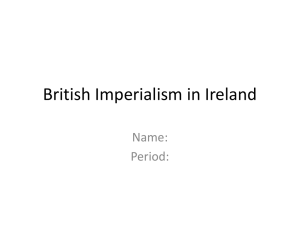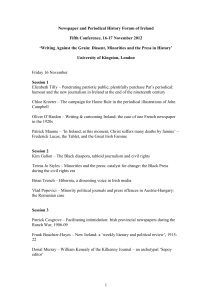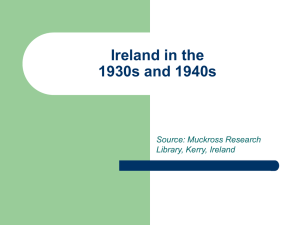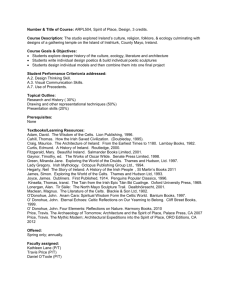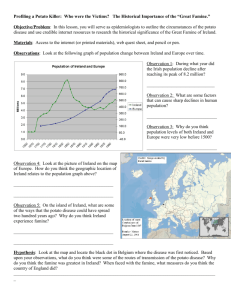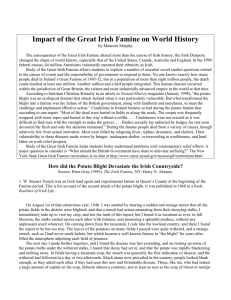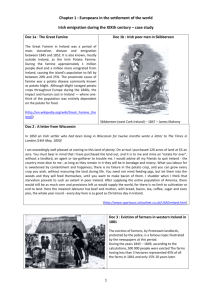The 19th Century: The Great Famine - school
advertisement
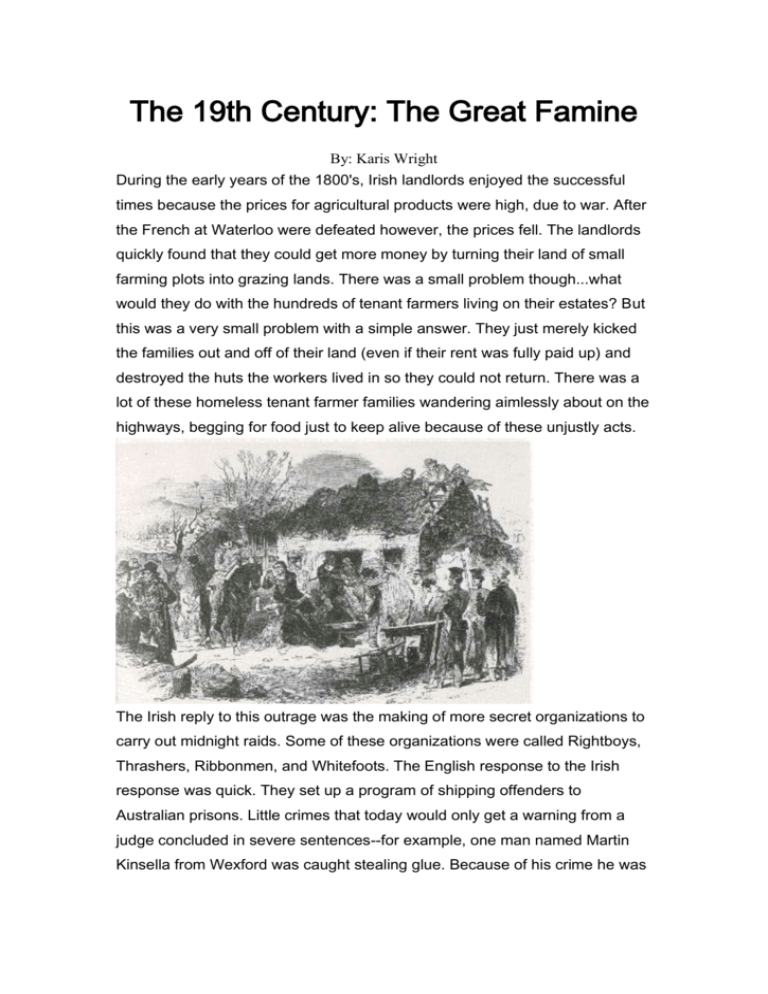
The 19th Century: The Great Famine By: Karis Wright During the early years of the 1800's, Irish landlords enjoyed the successful times because the prices for agricultural products were high, due to war. After the French at Waterloo were defeated however, the prices fell. The landlords quickly found that they could get more money by turning their land of small farming plots into grazing lands. There was a small problem though...what would they do with the hundreds of tenant farmers living on their estates? But this was a very small problem with a simple answer. They just merely kicked the families out and off of their land (even if their rent was fully paid up) and destroyed the huts the workers lived in so they could not return. There was a lot of these homeless tenant farmer families wandering aimlessly about on the highways, begging for food just to keep alive because of these unjustly acts. The Irish reply to this outrage was the making of more secret organizations to carry out midnight raids. Some of these organizations were called Rightboys, Thrashers, Ribbonmen, and Whitefoots. The English response to the Irish response was quick. They set up a program of shipping offenders to Australian prisons. Little crimes that today would only get a warning from a judge concluded in severe sentences--for example, one man named Martin Kinsella from Wexford was caught stealing glue. Because of his crime he was sentenced to Australia for seven years. Any crime that was even a little serious received a life sentence. One might assume that through all the years of depression, nothing worse could happen to the Irish, but then came "The Great Famine". As the nineteenth century progressed, the Irish became very dependent on the potato for their main food source. In fact, a majority of rural people lived on it completely (the potato is one of the few foods that has all the basic vitamins necessary to maintain a human life). Several English committees that studied the economic situation in Ireland warned that if there was a major failure of the potato crop, extensive starvation would result. All these warnings were ignored. In 1845 it happened, the biggest fear hit Ireland and suddenly became reality. A disease attacked the potato crop and half of the crop was destroyed. People harvested the few potatoes they had and prayed that the next years crop would be an abundant one. But the crop of 1846 suffered even more than the previous year. To add to the misery, that winter was the "severest in living memory". When the 1847 crop failed also, the Irish population of the whole nation was faced with starvation. This is when the first wave of immigrants escaped their starving homeland. The majority of this first group went to Canada because prices were very low--ships bringing lumber to England were glad to receive paying passengers instead of returning to Canada empty. Unfortunately, many of these people carried typhoid and many other diseases with them on to Canada. Ironically, during these tragic years it was only the potato crop that failed in Ireland. Wheat, oats, beef, mutton, pork, and poultry were all in excellent supply but the Irish-English landlords shipped these to the European continent to soften the starving there and receive a very good profit in return. When people today wonder about the hatred between the Irish and the English, they don't recognize the fact that Irish peoples memory is a long one and that stories are still being told about those ships leaving Irish ports loaded with food at the same time that their ancestors were eating grass to live. All throughout the years of the horrific famine, which continued past 1847, the English government was unwilling to give any money to Ireland to help with the famine because, as they said, "the Irish will use it only to buy guns to revolt against them." They were also reluctant to provide material aid such as soup kitchens because, "they will get used to the free food and never become of be self-sufficient." As an sign of how bad things were, when Americans (primarily Quakers) offered to send food to Ireland, England demanded that the food be first landed in England and then transferred to English ships--to assure that the English's shipping interests were fully employed. The American press so taunted this law, asking how greedy could England be at a time when hundreds of thousands of their people were starving, that England finally backed down and let the American ships sail directly to Ireland. Author C.W. Smith, an Englishwoman herself, was dumfounded by the way her countrymen were behaving during the famine years. As she says, "It is not characteristic of the English to behave as they behaved in Ireland. As a nation, the English have proved themselves of generosity, tolerance, and magnanimity, but not when Ireland is concerned. The moment the very name of Ireland is mentioned, the English seem to bid adieu to common feeling, common prudence, and common sense, and to act with the barbarity of tyrants and the fatuity of idiots." In 1849, Queen Victoria decided to visit Ireland. Press stories reported the pomp and circumstance escorted her arrival in Cork harbour. They described the great variety of troops and bands as she arrived by ship and it was this day that William Kindles became a local hero. A huge Union Jack was flying over the dock directly above the spot where the Royal parade was to pass. Somehow, William was able to get near the flagpole and cut the ropes so the flag dropped on the heads of the lead marching band (he promptly emigrated to America). During the Queen's visit no expense was spared to make the tour a success. At one banquet, $5,000 was spent on food and wine alone. The Duke of Leinster, one of the better Irish-English landowners and landlord over the area where many of the Chinless lived, was disgusted with the overwhelming spending. He wondered how in this land where hundreds of thousands were starving, where a family of six could be kept alive for a week for less than $1, the Queen's government could justify spending thousands of dollars to entertain a privileged few for one night! It is estimated one and a half million people died of starvation and disease in The Great Famine. Another million people emigrated, the people that had bitter feelings about the land they loved. Some cut off all ties with the motherland and never looked back. The majority however, never lost their love for the land they left. They continued to follow what was happening in Ireland. They talked and sang about it as they gathered together at social events. It was said of this immigrant generation that few found success and prosperity in America...this had to wait for their children's and grandchildren's generations. "For the great Gaels of Ireland Are the Men that God made mad. For all their wars are merry For all their songs are sad."




